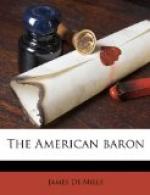Yet amidst all this wild alarm there was nothing which had so tremendous an effect upon Dacres as this last remark of Mrs. Willoughby’s.
[Illustration: “THE PRIEST FLUNG HIMSELF FORWARD.”]
CHAPTER XXXIV.
THE CRISIS OF LIFE.
When the Irish priest conjectured that it was about two o’clock in the morning he was not very far astray in his calculation. The short remarks that were exchanged between him and Ethel, and afterward between him and the men, were followed by a profound silence. Ethel sat by the side of the priest, with her head bent forward and her eyes closed as though she were asleep; yet sleep was farther from her than ever it had been, and the thrilling events of the night afforded sufficient material to keep her awake for many a long hour yet to come. Her mind was now filled with a thousand conflicting and most exciting fancies, in the midst of which she might again have sunk into despair had she not been sustained by the assurance of the priest.
Sitting near Ethel, the priest for some time looked fixedly ahead of him as though he were contemplating the solemn midnight scene, or meditating upon the beauties of nature. In truth, the scene around was one which was deserving even of the close attention which the priest appeared to give. Immediately before him lay the lake, its shore not far beneath, and almost at their feet. Around it arose the wooded hills, whose dark forms, darker from the gloom of night, threw profound shadows over the opposite shores. Near by the shore extended on either side. On the right there were fires, now burning low, yet occasionally sending forth flashes; on the left, and at some distance, might be seen the dusky outline of the old stone house. Behind them was the forest, vast, gloomy, clothed in impenetrable shade, in which lay their only hope of safety, yet where even now there lurked the watchful guards of the brigands. It was close behind them. Once in its shelter, and they might gain freedom; yet between them and it was an impassable barrier of enemies, and there also lay a still more impassable barrier in the grave where Hawbury lay. To fly, even if they could fly, would be to give him up to death; yet to remain, as they must remain, would be to doom him to death none the less, and themselves too.
Seated there, with his eyes directed toward the water, the priest saw nothing of the scene before him; his eyes were fixed on vacancy; his thoughts were endeavoring to grapple with the situation and master it. Yet so complicated was that situation, and so perplexing the dilemma in which he found himself—a dilemma where death perched upon either horn—that the good priest found his faculties becoming gradually more and more unable to deal with the difficulty, and he felt himself once more sinking down deeper and deeper into that abyss of despair from which he had but recently extricated himself.




